Combining parasitology with street theatre resulted in a colourful experience that delivered an important message about African sleeping sickness, as parasitologist Dr Nicola Veitch explains.
A highlight of my career to date has been working with an incredible team of collaborators from Glasgow and Malawi, creating an interactive street theatre performance to engage local communities in the science of African Sleeping Sickness.
I am a Senior Lecturer in Parasitology in the School of Infection and Immunity at the University of Glasgow, and Programme Coordinator of the Microbiology undergraduate degree. I enjoy finding innovative new ways to reach students in order to improve their university experience and understanding of various topics and key skills.
My research background is in Parasitology, with a specific interest in African Sleeping Sickness caused by the parasite Trypanosoma brucei.
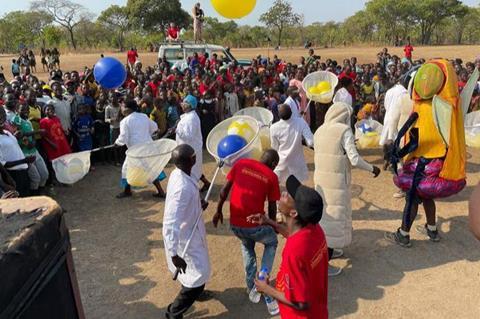
Another aspect of my role is co-ordinating students to develop outreach projects in local schools to inspire the next generation of scientists into teaching and engage school pupils with STEM subjects. I undertake my own outreach and public engagement activities, reaching communities that would not normally have access to science and research.
Street theatre
Inspired by work done by the Glasgow-based outdoor street theatre organisation Surge, a partnership was developed between artists and scientists, to explore a novel way of engaging communities.
I have been an avid audience member of work done by Surge for many years, as my sister Karen Veitch Thomson is a producer within the company.
This was an ideal opportunity to combine our expertise in arts and science and work together. Outdoor street theatre attracts diverse audiences and creates a sense of community. It is often non-verbal, so therefore can cross cultural and language barriers that can be created by conventional public engagement in some instances.
Scientific understanding
The project started with the aim of promoting an understanding of scientific research into Parasitology in Glasgow. I reached out to Prof Annette MacLeod, a principal investigator of sleeping sickness research with whom I had previously worked, and Dr Walt Adamson, a member of the research group, became actively involved in co-leading the project. Funding was obtained from University of Glasgow college public engagement grants, and the Microbiology Society to pilot the project and to allow project partners to start working together.
An outdoor performance was created with Life Science undergraduate and postgraduate students, early career researchers, lecturers, and a professional performer, directed by Surge’s artistic director Alan Richardson. We all had input into the development of the performance, using an iterative process of creation around the core theme of African Sleeping Sickness and the causative agent Trypanosoma brucei. Challenging for most of us, as few of us had any experience of being in this environment, but we were skilfully led and trained by the director and a professional performer to be creative, dance, move and interact with the group.
Breaking a leg
The performance took place at the annual Surge festival in Glasgow City Centre in July 2021. All of the scientists involved were certainly outwith their comfort zone; I was in a huge tsetse fly outfit, throwing out beach balls of ‘infectious parasites’ and others were scientists carrying large antibody nets to catch the infection.
The audience acted as the blood stream, wearing red paper hats, with the scientists weaving through, encouraging audience participation. But all of us took to the various roles with confidence and had a truly unique experience.
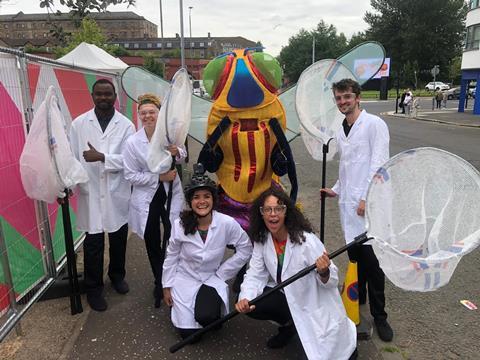
Following on from this, the project team were successful in securing a Public Engagement grant from the Wellcome Trust. This allowed us to work with Dr Janelisa Musaya, a researcher in Kamuzu University for Health Sciences in Malawi who has ongoing research collaborations with Prof Annette MacLeod.
Cast and crew
The project aim was to engage local communities in sleeping sickness endemic regions within Malawi, with health professionals and research scientists using street theatre, in order to build trust in science and understanding of the disease.
Janelisa skilfully put together an excellent team of collaborators in Malawi including health promotion officers Bwanalori Mwamlima and Garry Chilinga, John Alufandika from Voices Malawi, an outdoor street theatre organisation, and Lumbani Pete, an IT expert.
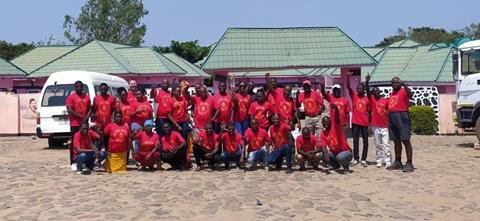
The team visited Scotland in August 2022 and together with Surge, we created a new outdoor street theatre performance for a football bonanza that would be taking place in Malawi in October that year. The new performance was piloted at Partick Thistle football club in Glasgow and was well received. This time I was a scientist during the performance, catching beach balls of infection that were batted around the crowd!
Talk about Tsetse
After much planning, Parasite Street Science moved to Malawi and became ‘Talk About Tsetse’. Being in Malawi was an incredible experience. The last time I had been in Africa I was a student, working in Zimbabwe on Schistosomiasis as part of a summer placement (many years ago!), so I was truly delighted at the prospect of going back to this beautiful continent.
Landing in the capital Lilongwe, we were warmly met by our collaborators that visited Scotland, and we had a 6-hour drive north to get to Rumphi district. We were met with many challenges during the trip, including a shortage of petrol and diesel, making travel challenging. There had been a cholera outbreak in Malawi the week we arrived (and to date is still an issue), so the health promotion officers had to do emergency health promotion interventions alongside the work on sleeping sickness.
The performance was developed using local knowledge from community participants and health promotion officers, to ensure it was appropriate for the cultural setting and would be effective in encouraging audience participation.
On the road
A team of 30 people took to the road, delivering six performances in Rumphi and Nkhotakota district. Performers included scientists, technicians, nurses and clinicians from local hospitals, community members with lived experiences of sleeping sickness, dancers and musicians from local dance and drama groups and Voices Malawi.
Netball and football bonanzas were pre-planned in remote villages to encourage a crowd to gather, with local drama groups performing initially, and then the Talk About Tsetse show took place. The performances attracted ~1000 people per day, with the audience dancing, singing and asking the team many questions about sleeping sickness.
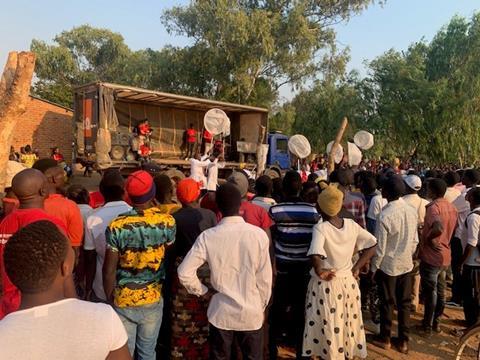
96% of audience members asked were likely to ask a scientist a question, with 94% enjoying the performance. This was followed up by a local radio show, with sleeping sickness experts answering questions phoned in from local community members. Local radio is a key communication tool in Malawi, as only ~10% of people have mobile phones and often there is limited internet or power in remote regions.
Capturing the experience
We felt it was important to document this project, so Hannah Bialic, the Public Engagement Manager from the Wellcome Centre for Integrative Parasitology in Glasgow, filmed the Malawi leg of the project, skilfully capturing the experience. Short videos were made from this footage by a Life Science final year project student, and embedded within a website created by Lumbani Pete.
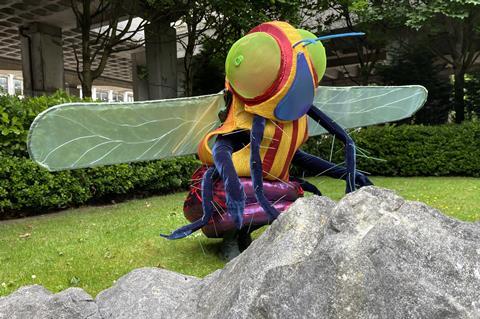
Meeting the team in Malawi was inspirational, and lifelong friendships have been made. We have been successful in securing funding to take the project out to local communities in Malawi using community cinema and this work is planned for November 2023. Costumes and props remain in Malawi and can be used in further outreach interventions.
Looking to the future, all involved all keen to foster our collaboration and continue to work together.
Dr Nicola Veitch is a Senior Lecturer in Parasitology in the School of Infection and Immunity at the University of Glasgow, and Programme Coordinator of the Microbiology undergraduate degree. She is part of the Society for Experimental Biology’s Outreach, Education and Diversity SEB group, which addresses how science is communicated to the public and how to improve the inclusivity of scientific research.
Topics
- African sleeping sickness
- Alan Richardson
- Annette MacLeod
- Applied Microbiology International
- Be inspired
- Bwanalori Mwamlima
- Community
- Garry Chilinga
- Hannah Bialic
- Infectious Disease
- Janelisa Musaya
- John Alufandika
- Kamuzu University for Health Sciences
- Lumbani Pete
- Middle East & Africa
- Parasitology
- Partick Thistle
- street theatre
- Surge
- Talk About Tsetse
- Trypanosoma brucei
- UK & Rest of Europe
- Voices Malawi
- Walt Adamson
- Wellcome Centre for Integrative Parasitology







No comments yet